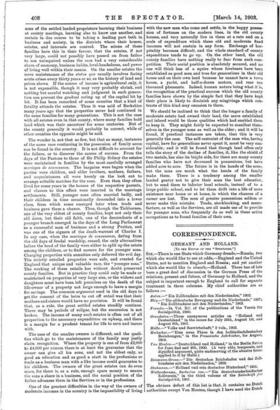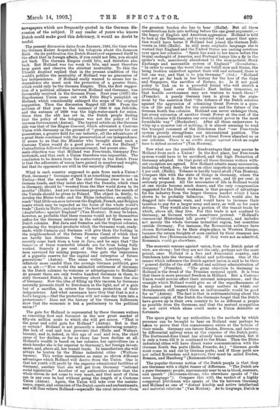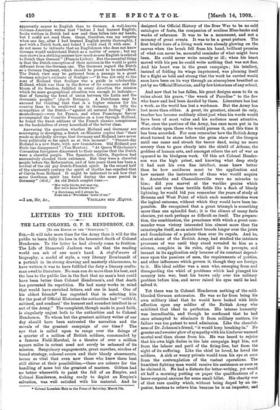CORRESPONDENCE.
GERMANY AND HOLLAND.
(To THE EDITOR OF THE "SPECTATOR."] SIR,—There is one State which Germany dreads,—Russia; two which she would like to see at odds,—England and the United States, not to mention England and Russia; and yet another which she would like to absorb,—Holland. There has of late been a great deal of discussion in the German Press of the relations, present and future, of Germany to Holland, and the subject is important enough to England to call for separate treatment in these columns. My chief authorities are as follows :- Anton.—" Ein Zollbiindniss mit den Niederlanden," 1902. Bey.—" Die alldeutsche Bewegung und die Niederlande," 1897; "Bin Zollbtindniss mit den Niederlanden," 1902.
Francke.—In Vol. XC. of the publications of the Verein f Sr Socialpolitik, 1900. Grenzboten.—Three anonymous articles on "Holland und Deutschland" in the issues for July 25th, August 1st, and August 8th, 1901.
Hatie.—" Volks und Seewirtschaft," 2 vols., 1902.
Ileckscher.—" Eine neue Phase in den holliindischdeutschen Beziehungen," in the Preuss-ische Jahrb licher, for August, 1902.
Van Houten.—" Deutschland und Holland," in the Berlin Nation for June 2nd and 9th, 1900. (A very able, temperate, and dignified argument, quite undeserving of the abusive terms
applied to it by Halle.) .
Reismann-Grone.—" Die deutschen Reiclishafen und das Zoll. biindniss mit den Niederlanden," 1899.
Stubmann," Holland und sein deutscher Hinterland,".1901. Waltershausen, Sartorius von.—" Bin deutschniederlandischer
Zollverein," in the third volume of the Zeitschrift f iir
Socialpolitik, 1901.
The obvious clefect of this list is that,. it contains no Dutch authorities except Van Houten, though I have used the Dutch newspapers which are frequently quoted in the German cussion of the subject. If any reader of yours who knows Dutch could make good this deficiency, it would no doubt be
useful.
The present discussion dates from January, 1898, the time when the German Kaiser despatched his telegram about the Jameson Raid. On its publication the Dutch Sta;idaard expressed itself to the effect that in foreign affairs, if you could not bite, you should not bark. The Germah Empire could bite, and therefore also bark. But Holland was too weak to bite, and must therefore keep quiet and observe the strictest neutrality. To this the Utrecht Dagblad replied that in the present condition of the world's politics the neutrality of Holland was no guarantee of her independence. If Holland really wanted to secure her in- dependence she must seek the protection of a greater State, which could only be the German Empire. This, the first sugges- tion of a political alliance between Holland and Germany, was favourably received in the German Press. Next year (1897) the Pan-German Union came out with Fritz Bley's pamphlet on Holland, which considerably enlarged the scope of the original suggestion. Then the discussion flagged till 1899. From the autumn of that year to the summer of 1900 it ran full-tide, and the autumn of 1899 was the high-water-mark for union. Since then the ebb has set in, the Dutch people finding that the policy of the telegram was not the policy of the Ograan Government (Anton). The:typical article on the German side was that of the Hague Courant, which advocated a Customs Union with Germany on the ground of "greater security for our possessions, a greater field for our industry, all the advantages of a great State combined with the preservation of our independence. It seems to us that the Minister who brought about such a Customs Union would do a good piece of work for Holland." Contradiction followed this pronouncement, but assent also. The main objection was that Holland was Free-trade, Germany Pro- tectionist, and that such a Union therefore was impossible. The conclusion to be drawn from the controversy in the Dutch Press is that the adherents of union have gained in number and weight, but that its opponents are still in the majority (Francke).
What is each country supposed to gain from such a Union ? First, Germany ? Germans regard it as something monstrous—an Unding—that the mouth of the chief German river is not in German hands, and they insist also that the Danube, which rises in Germany, should be "wrested from the Slav world down to its mouths" (Halle). And yet no German proposes that the mouth of the Vistula should be given to Poland. The object is, firstly, to develop the Rhine traffic and the Rhine industries; secondly, to reach" that little sea-area between the English, French, and Belgian coasts which may be regarded as the focus of the whole world's trade" (Deals in Halle), and also as "the best Continental sally-port (Ausfallsthor) against England" (Van Houten). It may be taken, however, as probable that these reasons would not by themselves suffice for the German interest in the subject if there were no Dutch colonies. But Java and Sumatra are the tropical colonies, producing the tropical products which the Germans want, ready- made, while Curacoa and Surinam will give them the footing in the neighbourhood of the future Panama Canal of which they are hardly less desirous. One of my authorities has but recently come back from a tour in Java, and he says that "the treasires of these wonderful islands are far from being fully worked. Scarcely + per cent, of the Dutch archipelago has been surveyed for mining purposes. One gets the impression of, a gigantic reserve for the capital and enterprise of future generations" (Anton). The -same writer, however,- who is infinitely more candid than the average German publicist, goes on to ask :—" How would the unlimited settlement of Germans in the Dutch colonies be welcome or advantageous to Holland? At present there are only twelve hundred Germans in them, to sixty thousand Dutch, in a territory about four times the size of 'Germany. Now the idea of filling up this vacuum by Germans naturally presents itself to Dutchmen in the light, not of 'a gain but of a sacrifice, in return for German protection of their independence. And what assurance have they that that is not a fool's bargain,—that the protection -will not some day turn into a protectorate ? Does not the history of the German Zollverein show that the economic is but a preliminary to the political union?"
The gain for Holland is represented by these German writers as consisting first and foremost in the new great market of fifty-six million souls to which she will get access. "That is the great and solid gain for Holland" (Anton). But is that so certain ? Holland is not primarily a manufacturing country. Her lack of coal and iron prevents that (Halle and Walters- hansom), and is, indeed, in this age of coal and iron, the chief cause of her decline, so far as there has been decline at all. Holland's wealth is based on her colonies, her agriculture (as a stock-breeder she is far superior to Germany), her foreign invest- ments, and, above all, her transit trade. In manufacture she will always be beaten by the Rhine industrial cities (Walters- hausen). This writer enumerates as many as eleven different advantages which Holland will derive from the Union. One is that her youth will profit by the superior educational facilities of Germany, another that she will get from Germany "rational social legislation." Another of my authorities admits that the whole eleven do not come to very much, and that most of them can in any case be had without going the length of a Customs Union (Anton). Again, the Union will take over the mainte- nance, repair, and extension of the Dutch canals and embankments, and will thus relieve Holland—especially the rural interest-from the greatest burden she has to bear (Halle). But all these considerations fade into nothing before the one great argument,— the bogey of English and American aggression. Holland is told to look at the Transvaal, and to consider what aspect that ques- tion would have borne if Holland had joined the German Zoll- verein in 1830 (Halle). In still more emphatic language she is warned that England and the United States are casting covetous eyes upon her colonies. " Spain has sunk to her knees -before the brutal onslaught of America, and Portugal hangs like a fly in the spider's web, mercilessly abandoned to the monopolistic Stock Exchange and mercantile system of England" (Grenzboten). "In order to escape the worst that can befall men and States, the being trodden underfoot against their will and unheard, there is but one way, and that is to join Germany" (ibid.) "Holland need not go far back in her history for the loss of the Cape and Singapore, the sacrifice of Borneo, &c. Is it not good policy to link on to a powerful friend who will stretch a protecting hand over Holland's East Indian treasuries, so that hostile covetousness may not venture to touch them ?" (Francke). A purely German turn is given to the argu- ment by the assertion that "the defence of the Dutch colonies against the aggression of colonising Great Powers is a ques- tion of life and death for the existence and the future of the German South Sea colonies. Holland can never endanger them, but every extension of another Great Power at the cost of the Dutch colonies will threaten our own colonial power in the most formidable way" (Heckscher). After all these endeavours to whip up a monster out of nothing, it is almost amusing to read the tranquil comment of the Dutchman that "our Free-trade system greatly strengthens our international position. The world in general would only lose if a Great Power absorbed us or our colonies. There is no visible danger against which we might have to defend ourselves" (Van Houten).
Now what are the possible disadvantages that may accrue to Holland from such a Union? In the first place, her Free-trade system would have to be sacrificed, and the high Protection of Germany adopted. On that point all these German writers with- out exception are agreed. Now Holland admits many necessaries, including wheat, free ; the tax on other imports in no case exceeds 5 per cent. (Halle). Tobacco is hardly taxed at all (Van Houten). Compare this with the state of things in Germany, where the duty on wheat is from 20 to 30 per cent., and 50 per cent. is seriously proposed. All the necessaries of life in Holland would at one stroke become much dearer, and the only compensation suggested for the Dutch workman is that prospect of advantage for his industry from the larger German market which I have shown to be probably fallacious. The Dutch would also be dragged into German wars, and would have to increase their taxation to pay for a larger army and navy, as well as for coast defence. They would also lose a portion of the transit trade by which, above all, they live. For this trade is not confined to Germany, as German writers sometimes pretend. "Holland's commercial Hinterland hi's grown" (Stubmann), and includes not merely the whole German industrial region, but countries outside Germany. For instance, the Roumanian railways have chosen Rotterdam to be their staple-place in Western Europe, becanse the return freights of corn carried by their steamers are admitted free (Reismann-Grone). If they were not so admitted, Roumania xould go elsewhere.
The economic reasons against union, from the Dutch point of view, are strong ; but they are not the only, perhaps not the most potent, ones. Holland is a free and democratic country, and Dutchmen hate the German official and policeman. One of the causes which influence the Dutch against union is said to be their "general dislike of the stiff official and military administration of Germany" (Francke). "The great objection to Germany in Holland is the dread of the Prussian corporal spirit. It is true that there is more personal freedom in Holland. But a Customs Union would nowise affect their internal independence ; and the example which Holland would give us of the superfluousness of the police and bureaucracy in many matters in which our Governments still regard them as indispensable would be good for us" (Anton). The fact is that in sentimentalising about the Germanic origin of the Dutch the Germans forget that the Dutch have grown up in their own country to be as different a people as possible from the Germans, and that the mutual sympathies do not exist which alone could make a Union desirable or fortunate.
The space given by my authorities to the methods by which pressure can be brought to bear on Holland may perhaps be taken to prove that this consciousness exists at the bottom of their minds. Germany can favour Emden, Bremen, and Antwerp by differential railway rates at the expense of the Dutch ports. The Dortmund-Ems Canal has already been constructed, but it is only a torso till it is continued to the Rhine. Then the Rhine industrial cities will have direct water communication with the German North Sea ports (Halle, Francke, &c.) "German goods must come in and out by German ports ; and if those ports are not called Rotterdam and Antwerp, they must be called Emden, Bremen, and Hamburg" (Reismann-Grone).
The popular German notion of the Dutch people is that they are Germans with a slight veneer of difference. "The Dutch are a pure Germanic people, uncommonly near to us in blood, manners, and speech" (Reismann-Grone, who elsewhere speaks of "the same language"). Compare this with the verdict of a highly competent Dutchman who speaks of the tie between Germany and Holland as one of "distant kinship and active intellectual and material relations" (Van Houten). As to language, Dutch is
apparently nearer to English than to German. A well-known German-American writes that "before I had learned English, books written in Dutch had now and then fallen into my hands, but I could not read them. Great, therefore, was my surprise when one day, after I had learned English pretty thoroughly, I met with a Dutch book, and foimd I could read it with ease. I do not mean to intimate that an Englishman who does not know German would understand Dutch as a matter of course ; but my case shows in a striking manner how much nearer English is related to Dutch than German" (Francis Lieber). But the essential thing is that the Dutch conception of their mission in the world is quite different from the German one. The Germans regard the Dutch as a German fragment, which should be proud to be reabsorbed. The Dutch view may be gathered from a passage in a great German scholar's estimate of Scaliger :—" It was not only to the sons of Holland that Scaliger was a guide in scholarship. Holland, which was then in the flower of its commerce and the bloom of its freedom, fulfilled in every direction the mission which its mere geographical situation was enough to indicate,— that of forming the bond of union between the Latin and the Germanic peoples" (Jacob Bernays). A Dutchman may be excused for thinking that that is a higher mission for his country than to be swallowed up in Germany. In 1870 the sympathies of the Dutch—" against all natural feeling" (Reis- mann-Grone)—were for France, and when Francisque Sarcey accompanied the Comedie Francaise on a tour through Holland, he found the finest editions of the French classics conspicuous on the bookshelves of every household of the better class.
Answering the question whether Holland and Germany are converging or diverging, a Dutch ex-Minister replies that "their roads so decidedly diverge, that Germany and Holland have never been politically so far apart as at this moment." "Present-day Holland is a new State, with new foundations. Old Holland qua State has disappeared" (Van Houten). "At Queen Wilhelmina's Coronation foreigners discovered to their surprise that the Dutch were a cheerful people. The Spaniards, Calvin, Napoleon had successively clouded their existence. But they were a cheerful people before the Reformation, and of late years there has been a revival of the old gay Dutch-Flemish spirit. In the second half of the nineteenth century the spirit of Goethe has expelled that of Calvin from Holland. It might be indiscreet to ask how that same G-oethean spirit has fared during the same period in Germany" (ibid.) An old Dutch couplet runs :—
"Iter welle bleiwe wat mer sin, Bier wells keine Preisse sin."
"A Dutchman will I always be, None can a ' Proosbian' make of me."












































 Previous page
Previous page